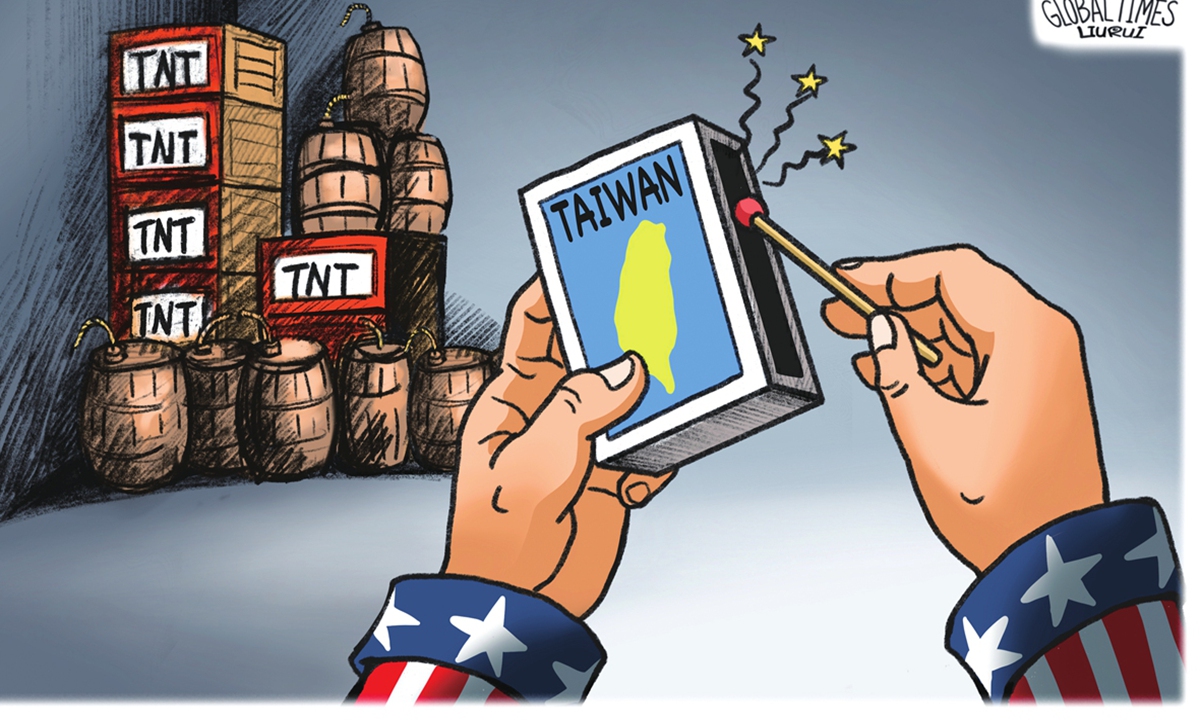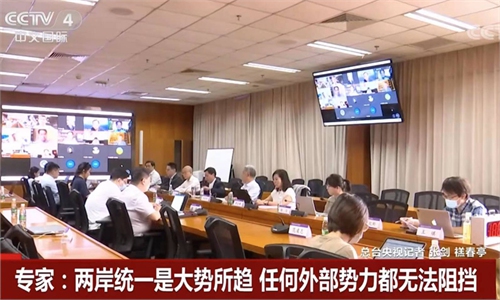
Illustration:Liu Rui/GT
The Indo-Pacific Strategy, arms sales to Taiwan, visits by lawmakers to the island one after another, and US House Speaker Nancy Pelosi's provocative visit that had drawn worldwide attention and controversy, naturally led to strong condemnation and a resolute response from China. All these shows are centered on Taiwan question.
There is but one China in the world and Taiwan is part of China. In 1943, the Cairo Declaration clearly stated that all territories that Japan stole from the Chinese, including Taiwan, shall be restored to China. In 1971, the 26th Session of the UN General Assembly passed Resolution 2758, recognizing that the representatives of the government of the People's Republic of China are the only lawful representatives of China to the UN.
The three China-US joint communiqués, which guide the diplomatic ties between the two countries, made it clear, "The United States of America recognizes the Government of the People's Republic of China as the sole legal Government of China. Within this context, the people of the United States will maintain cultural, commercial, and other unofficial relations with the people of Taiwan."
Pelosi's provocative visit to Taiwan is a blatant violation of all the above-mentioned documents and the US commitment to the one-China policy. Without prior official announcement, the third-highest-ranking official in the US government sneaked into Taiwan flying with a US military plane. She was accorded full-protocol reception by Taiwan's Democratic Progressive Party, a pursuer of Taiwan's secession from the motherland. After the visit, Pelosi said in a press conference that "in all of the countries, we met with the leadership of the country" and Taiwan is "one of the freest countries in the world." Yet, the US government still insists that the visit is "consistent with our one-China policy."
Pelosi's provocative visit has fully exposed the US' scheme and strategy to contain China. It has been playing the "Taiwan card" for a long time and decided to pursue brinkmanship amid rising tensions with China.
The US is trying to turn Taiwan into an unsinkable aircraft carrier for its Indo-Pacific Strategy. While it was written in the Joint Communiqué of the People's Republic of China and the United States of America, signed on August 17, 1982, that the US "intends gradually to reduce its sale of arms to Taiwan, leading, over a period of time, to a final resolution," it has been selling weapons to Taiwan to make it into a "porcupine" for China. US lawmakers are even pushing a bipartisan bill that would alter US policy toward Taiwan, including designating Taiwan as a major non-NATO ally, providing it with $4.5 billion in security aid and supporting its participation in international organizations.
During her provocative visit to the Taiwan island, Pelosi said that this visit was part of the Biden administration's Indo-Pacific Strategy, clearly demonstrating that this strategy is by no means an inclusive and open initiative for regional cooperation, but a sinister scheme as part of a new cold war that tries to turn Taiwan into a bridgehead against China, and it undermines peace and stability of the region.
The US wants to play the trick of ideological confrontation to separate Taiwan from China. During her visit, Pelosi labeled the Chinese mainland as an "autocracy" and Taiwan as a "democracy," trying to pit Taiwan against its motherland in an ideological way. Again, she made the same mistake that the US "moralists" have kept making. If Pelosi truly cares about democracy and human rights, why wouldn't she pay a visit to Afghanistan, Iraq, Syria or Libya, where she could express repentance over the brutal killing of hundreds of thousands of innocent civilians by the US military and vow to prevent such atrocities resulting from the US violation of the UN Charter and norms in international relations. In essence, the US is trying to impose "American values" and incite political hatred and ideological difference between the two sides across the Taiwan Straits.
The US also wants to cut the economic bond between the Chinese mainland and Taiwan. During her visit, Pelosi met with Mark Liu, chairman of Taiwan Semiconductor Manufacturing Co (TSMC). After forcing TSMC to set up factories in the US and hand over its confidential data, the US passed a $280 billion chip bill and tried to promote the "Chip 4," which includes the US, Japan, South Korea and Taiwan island. The purpose is simple: To build a supply chain of chips that excludes the Chinese mainland, blocking the development of its chip industry.
Here is what the US has been doing: Creating a conflict when there is none, creating a crime and then putting the victim in the defendant's dock. But the world has seen it all. It is the people of the two sides across the Taiwan Straits who have a say about the future of this island, and not and never the American politicians or the "Taiwan independence" separatist forces.
The author is a commentator on international affairs, writing regularly for Xinhua News Agency, Global Times, CGTN, China Daily and so on. He can be reached at xinping604@gmail.com.

